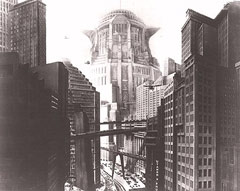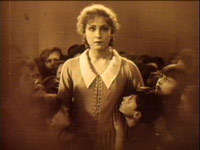Fritz Lang's Metropolis screened in the National Gallery with live score by 3epkano

A Dublin Film Festival Gala event was sceened in the lavish setting of the Shaw room in the National Gallery on 22 Feburary to a capacity crowd. A backdrop of chandeliers and giant paintings set the mood for one of the most epic science fiction movies of all time, Fritz Lang's 1926 silent movie, 'Metropolis'. The screening was accompanied by an original score, composed and performed live by 3epkano (prounced threpkano) .
Set in 2026, a hundred years from when it was made, Lang's best known work is a highly stylized piece of German Expressionism, a silent movie that featured a cast of thousands and has influenced cinema immeasurably. The cityscape of Blade Runner, for example, owes a huge debt to Lang's vision.
 The dramatic but entirely unreal architecture of the set portrays a future metropolis unlike anything that existed in the 1920's. Ruled by inhabitants of the man-made gardens in the upper reaches of the city, where days are spent in unthinking games, the underbelly of the city is literally the place where the workers toil. Underground, the clocks count only 10 hours in a day, in order to cram another day into a working week. The people are worked to exhaustion, until they are repalced by the next shift. The machines are tended by the workers, but in fact the workers are at the mercy of the machines' never-ending frantic pace.
The dramatic but entirely unreal architecture of the set portrays a future metropolis unlike anything that existed in the 1920's. Ruled by inhabitants of the man-made gardens in the upper reaches of the city, where days are spent in unthinking games, the underbelly of the city is literally the place where the workers toil. Underground, the clocks count only 10 hours in a day, in order to cram another day into a working week. The people are worked to exhaustion, until they are repalced by the next shift. The machines are tended by the workers, but in fact the workers are at the mercy of the machines' never-ending frantic pace.
 Into this setting comes Maria, a woman who the workers treat as their saviour. She leads the children of the workers to the surface one day, so that their 'brothers', the sons of the city rulers, can see them. Freder, son of man who masterminded the metropolis, becomes enchanted by Maria, and follows her to the factories, where he gains an appreciation of the workers plight. Soon Freder is caught up in a complicated plot involving a workers revolt, a mad inventor who wishes to destroy the city and a robot version of Maria who leads the city leaders.
Into this setting comes Maria, a woman who the workers treat as their saviour. She leads the children of the workers to the surface one day, so that their 'brothers', the sons of the city rulers, can see them. Freder, son of man who masterminded the metropolis, becomes enchanted by Maria, and follows her to the factories, where he gains an appreciation of the workers plight. Soon Freder is caught up in a complicated plot involving a workers revolt, a mad inventor who wishes to destroy the city and a robot version of Maria who leads the city leaders.
The version of Metropolis shown in the National Gallery was a two hour edit. As the film has been lost and remade from different cuts, there are several different versions in existence. It was stated at the start of the screening that 25% of Metropolis is permanently lost. Certain parts of the action are filled in by text on the screen, yet this does not take from ones enjoyment of the movie.
An important addition to the occasion was the presence of 3epkano, a Dublin based 7-piece band, featuring guitars, cello, viola, keyboard and drums. Talking to band members after the 2 hour performance, Village asked whether the musicans read from music composed specifically to accompany the film. According to drummer James Macken, each member writes what he described as a 'blueprint', rather than a more traditional score. They play facing the screen and then improvise around the images, 'a bit like jazz', said Macken. While one member joked that he had never seen the movie before, the preperation and skill of 3epkano was evident in the intricate music, moving in time to the balletic cheoragraphy of the future city, at times quiet and unobtrusive, at times tense and loud, but perfectly apt for each scene.
3epkano play the Cork French Film Festival on Saturday 3 March in the Triskel, where they will preform new scores to Dadist experimental short films of the 1920's as well as Jean Cocteau's first film, Blood of a Poet. For further information on the Cork French Film, 1 - 9 March, www.corkfrenchfilmfestival.com and see the upcoming Village interview with festival curator Paul Callanan.
By Tom Rowe
